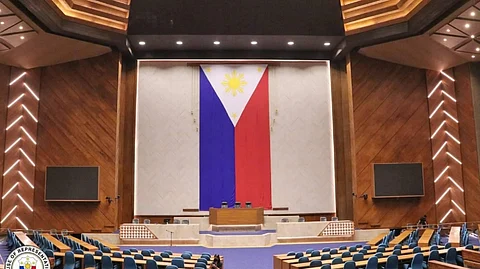
- NEWS
- the EDIT
- COMMENTARY
- BUSINESS
- LIFE
- SHOW
- ACTION
- GLOBAL GOALS
- SNAPS
- DYARYO TIRADA
- MORE

The House of Representatives has urged the Supreme Court to reverse its 25 July ruling on the controversial impeachment complaints against Vice President Sara Duterte in a motion for reconsideration it has filed through the Office of the Solicitor General.
The High Court decision in G.R. Nos. 278353 and 278359 was challenged in the motion that argued the ruling was based on erroneous factual and legal conclusions, particularly the constitutional process for initiating an impeachment and the application of the one-year bar rule under Article XI, Section 3(5) of the 1987 Constitution.
In the motion, the House asserted that it committed no grave abuse of discretion and had complied fully with the constitutional and jurisprudential requirements.
The motion clarified that the first three impeachment complaints against the Vice President were not disregarded, emphasizing that they were properly included in the Order of Business within the prescribed 10-day period.
The fourth complaint, which was endorsed by at least one-third of the House members, was validly processed and transmitted to the Senate, effectively activating the one-year bar rule and rendering the three earlier complaints moot.
The motion also disputed the Supreme Court’s findings, particularly the sequence of events that took place on 5 February.
The House clarified that the fourth impeachment complaint had already been adopted and transmitted to the Senate before the formal archiving of the first three complaints.
It argued that the timeline negated the Court’s conclusion that the House violated the one-year prohibition on multiple impeachment complaints against the same official.
The House further argued that the Constitution does not place one mode of impeachment above another, emphasizing that complaints filed by citizens should not take precedence over those endorsed by one-third of the House, as both are constitutionally valid paths to impeachment.
On the issue of due process, the House asserted that procedural guarantees apply during the Senate impeachment trial and are not required in the House’s preliminary proceedings.
The motion argued that the Constitution does not obligate the House to allow the respondent to be heard before it transmits the Articles of Impeachment.
It also urged the Court to apply any new doctrines or interpretations only on a prospective basis.
It argued that its actions were guided by existing legal precedents, particularly the 2003 decision in Francisco v. House of Representatives which has long governed the procedures surrounding impeachment complaints.
Further, the House warned against what it described as a judicial overreach. It stressed that impeachment is a political process entrusted by the Constitution solely to Congress, and that the Judiciary should exercise restraint when reviewing the internal proceedings of a co-equal branch of government.
The House, in its prayer, asked the High Court to revoke the immediately executory nature of its 25 July decision, reconsider its ruling, dismiss the petitions for lack of merit, and grant any other relief deemed just and equitable.
Speaker: SC inventing new rules
Meanwhile, Speaker Martin Romualdez reminds the SC that the power to initiate impeachment rests solely in the House of Representatives, “not shared, not subject to pre-approval and not conditional.”
He warned that the SC’s inventing new rules not in line with the Constitution and applying them retroactively “is not just unfair, but constitutionally suspect.”
The House chief emphasized that no branch of government should dictate the boundaries of its accountability, and that members of the SC are also impeachable officials.
“The Supreme Court is a coequal branch of government. Its wisdom is deep. Its authority is real. But its Members — like the President and the Vice President — are also impeachable officers,” he pointed out.
Romualdez added, “When the Court lays down rules for how it, or others like it, may be impeached, it puts itself in the dangerous position of writing conditions that may shield itself from future accountability.
“Because if impeachments can be blocked by misunderstood facts, or rules made after the fact, then accountability is not upheld: It is denied,” he continued.
Nonetheless, Romualdez said the filing of the motion is not to provoke or to assert supremacy, but to restore balance.
Senate minority members plan to file a resolution to proceed with Duterte’s trial, citing the legislature’s independence from the judiciary.
Duterte was the first second-highest official impeached by the House on grounds of graft and corruption, bribery, betrayal of public trust, culpable violation of the Constitution, and other high crimes.
